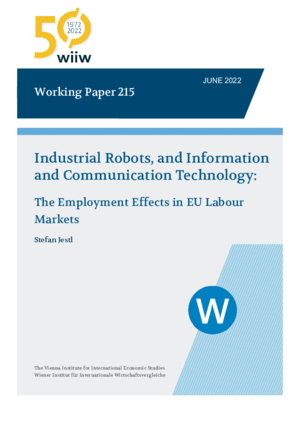Industrial Robots, and Information and Communication Technology: The Employment Effects in EU Labour Markets
wiiw Working Paper No. 215, June 2022
44 pages including 8 Tables and 7 Figures
This paper explores the effects of industrial robots and information and communication technology (ICT) on regional employment in EU countries. The empirical analysis relies on a harmonised comprehensive regional dataset, which combines business statistics and national and regional accounts data. This rich dataset enables us to provide detailed insights into the employment effects of automation and computerisation in EU regions for the period 2001-2016. The results suggest relatively weak effects on regional total employment dynamics. However, employment effects differ between manufacturing and non-manufacturing industries. Industrial robots show negative employment effects in local manufacturing industries, but positive employment effects in local non-manufacturing industries. While the negative effect is concentrated in particular local manufacturing industries, the positive effect operates in local service industries. IT investments show positive employment effects only in local manufacturing industries, while CT investments are shown to be irrelevant for employment dynamics. In contrast, software and database investments have had a predominantly negative impact on local employment in both local manufacturing and non-manufacturing industries.
Keywords: Industrial robots, ICT, EU labour markets, employment effects
JEL classification: J23, L60, O33, R11
Countries covered: Austria, Belgium, Bulgaria, Czechia, Denmark, Estonia, Finland, France, Germany, Greece, Hungary, Ireland, Italy, Lithuania, Netherlands, Poland, Portugal, Romania, Slovakia, Slovenia, Spain, Sweden, United Kingdom
Research Areas: Labour, Migration and Income Distribution, Regional Development
